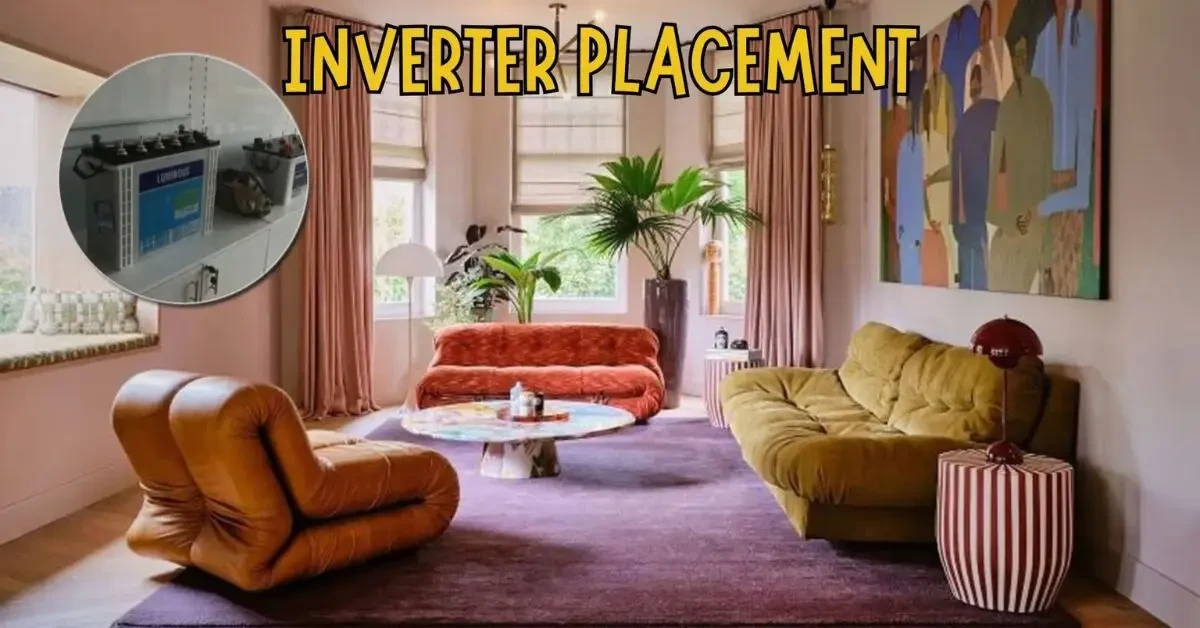




10806 Views | October 31, 2024
Over the past few years, inverters have become part of everyday life as they offer power backup during the blackouts while electrical devices need a consistent supply of electrical energy. However, with growing dependence on technology it is important not only to look at the functionality of items such as inverters but their location as per vastu shastra the science of designing space in India.
In this blog, let me explain a little about inverter Vastu, the importance of it, and glimpse on the right location of the inverter based on Vastu science.

Vastu Shastra is the oldest technique of designing structures in India with the basic purpose of making the architectural patterns harmonize with the natural energy. This is founded on the fact that the five fundamental principles of existence, namely earth, water, fire, air, and space, have an affinity to one another, and that all of them are necessary for the total well-being of man and society. By doing so, people should be in a position to access a favorable environment that corresponds with nature's forces, resulting in health, wealth, and happiness.
In this context, inverter vastu plays a key role by ensuring the harmonious flow of energy in spaces that use inverters, thereby enhancing the positive effects on the inhabitants.
Inverters are appliances that ensure direct current (DC) power is converted into an alternating current power (AC) to power home and business. They are mostly important during blackouts because they ensure that electrical power is supplied to basic appliances such as lamps, ceiling fans, refrigerators and air conditioners.
Despite the concept that an inverter is a very basic product when seen from the technical point of view, the use of an inverter modifies the daily existence of users in many ways. As it remains in use for the supply of energy at all times, the location of the inverter should be in compliance with Vastu Shastra so that the positive energy is not affected in the area.
According to Vastu Shastra, the placement of inverters is of utmost importance as it can affect the energy flow in your home or office. Incorrect placement can lead to a variety of issues, including disruption of energy flow, negative vibrations, and a decrease in the inverter’s efficiency. Below are some key inverter Vastu tips for placing your inverter:
South-East direction is governed by fire being considerate to power, energy and vitality. This direction is widely believed to be an optimal position for installing electrical appliances such as inverters. Since the inverter is a source of energy in most cases, the best place for it should be in this direction so that there occurs an efficient flow of energy. Some people think that putting the inverter in this location will enable it to work effectively without causing an off-balance appearance of the house or office.
Similar to the North East direction The North East direction is associated with water elements and as per Vastu this area should not be used for placing heavy electrical appliances or gadgets. Energy circulates continuously in the gadgets such as inverters and placing these gadgets in the water element direction, thus interrupts the balance of the element. This can cause turmoil within the home or at the specific workplace and thus destabilize the coherence of that environment. Thus, if possible it is not recommended to fixate the inverter in the North-East corner of the room/ house.
South-Western direction is regarded as the direction of stability and strength. Although this direction is designated for bedrooms and the place where the owner rests, it is suitable for installing inverters in some situations. Locating the inverter in the South West corner is a good practice because the area has minimal chances of getting vandals, the device being heavy, any movement can disrupt the circuits of electricity supply. However this should be done carefully, because power output from the inverter could interfere with sleep and calm if located close to the living spaces.
The West direction is another good choice for inverter placement as well. This direction is associated with the earth element which symbolizes those things that are down to earth. The West is effective for energy related appliances as it helps in maintaining the energy field of the house balanced/regulated. Furthermore, the location of the inverter in the West provides relatively secure distance from the important zones like the North East or South East corner of the house which are most vulnerable to energy fluctuations.
To begin with, the focus of Vastu Shastra classifies the central portion of the house or office as the Brahmasthan as the most important area. Many agree that it connects the front and back of the space and no large equipment or objects should occupy the area. The use of an inverter should not be placed in this central position because it will ruin the manner of energy flow and lead to stress, anxiety and even health implications to the people who occupy the building. It should also be noted that the center of the house should be unplugged and remain empty for electric devices, so the energy is good there.
Inverters should not be placed under staircases. Shastras state that it is very unsafe and unfavorable to have electrical appliances such as inverters and batteries beneath stairs. Stair cases are considered to be the objects that bring about movement in a particular level and putting an inverter here and there hampers the free flow of positive energy. They prefer to locate the inverter in a region with good air circulation, and this must not be near structural frames such as stairs.
As a result of this, it comes as a surprise that inverters produce heat during operation, thus calling for adequate ventilation for the equipment. The same air if not circulated can cause the device to heat, meaning less efficiency and a shorter lifespan. Moreover, conditions such as inadequate airflow are likely to cause buildup of negative energy – and this may affect the disposition of the environment. It will be wise to ensure that the inverter is installed at a location that provides sufficient air circulation, so that the functionality of the device is optimized, and the energy in the surrounding environment strengthened.

Clear Surroundings: Ensure that the surrounding environment of the inverter is well cleaned and no material is stored nearby. A clean environment when it comes to physical arrangement means that the environment is blocked free of unnecessary items, energy levels are not stagnated.
Grounding the Inverter: Before commencing the installation process of PV inverter, make sure you ground the inverter to avoid any form of electrical shock and increase its performance.
Regular Maintenance: To get the best out of your inverter, you should periodically inspect or Baker while doing so to check all the connections. Optimized devices tend to have long durations and little influence on the energy balance of your space.
Inverter Vastu is a very important factor that you should not neglect when trying to have a perfect balance in your home or at the office. If you strictly follow these Vastu recommendations, you should be able to choose the right placement for your inverter and let the positive energy flow and be in the favour of all those who are in that space. Proper placement brings about efficiency of the inverter and as well places it in harmony with the natural world hence providing prosperity, stability and peace to the space.